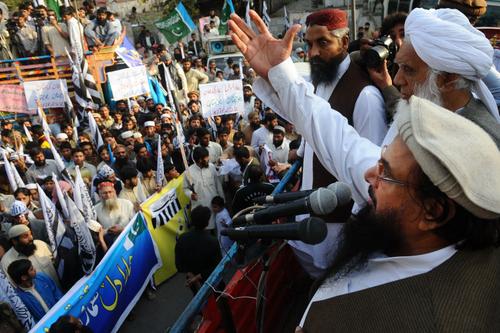IndoPak: America’s $10 million mystery – a bounty on Hafiz Saeed?
Here he is! Where’s my $10 million? The US offered a $10 million bounty for information leading to the arrest of Pakistan’s Hafiz Saeed. But the alleged mastermind of the November 2008 attacks on Mumbai is a popular public figure who lives openly in Pakistan — under the protection of the Inter-Services Intelligence agency, India claims.
Officially, India welcomed the US decision to offer a $10 million bounty for information leading to the capture of alleged Pakistani terrorist Hafiz Saeed, whom both the US and India claim is still the leader of Lashkar-e-Toiba. But unofficially? Unofficially, Indians are a little perplexed.
"India welcomes this new initiative of US," India's CNN/IBN news channel quoted Indian External Affairs Minister SM Krishna as saying. "This sends a strong message for the perpetrators of terrorism. This shows that international community stands united in fight against terrorism."
But on NDTV they were asking viewers if they thought the bounty was a joke, according to the Wall Street Journal. It certainly sounds like one, though its target, and how Washington expects it to go over, remains a mystery.
India has long asserted that Saeed remains in charge of Lashkar-e-Toiba and was among the masterminds of the November 2008 terrorist attacks in Mumbai, as well as many past incidents. But nobody appears to be very clear on just what the US bounty on his head means, considering that Pakistan has always resisted taking any action against him.
In Islamabad, the line is that Saeed no longer has any connection with Lashkar, and heads a purely charitable organization called the Jamaat-ud-Dawa (JuD). In that capacity, he makes frequent public appearances to deliver anti-India and anti-America diatribes. In other words, he's not hiding out — even under the noses of the authorities on the outskirts of a military school or some such.
"I'm very puzzled," said former Indian foreign secretary Kanwal Sibal in a phone interview with GlobalPost. "I could understand a bounty on a person who's a fugitve and an outlaw. But he's a man who's publicly active and has the support of the ISI and the Punjab government on that side. He's an important figure in the establishment. When the US declares a bounty on his head, what does that mean? Is it an invitation to eliminate him? Is it a demand to the Pakistan government to arrest him and turn him over to the US?"
Either way, it's not likely to be very productive. Given the state of US-Pakistan relations, it hardly seems the time for another Abbotabad-type strike — though a $10 million paycheck might motivate a Raymond Davis or three. And if it's an ultimatum or an offer to the Pakistani establishment itself, it's self-defeating by its very nature: Anybody with a US price on his head is practically untouchable, given the domestic political ramifications for anybody who tried to cash in.
"They would take it as hugely insulting to expect that the Pakistan government for $10 million will give up Hafiz Saeed," said Sibal. "Given all the other issues bedeviling the relationship, they would say that it's the height of lack of respect for Pakistan."
The story you just read is accessible and free to all because thousands of listeners and readers contribute to our nonprofit newsroom. We go deep to bring you the human-centered international reporting that you know you can trust. To do this work and to do it well, we rely on the support of our listeners. If you appreciated our coverage this year, if there was a story that made you pause or a song that moved you, would you consider making a gift to sustain our work through 2024 and beyond?
